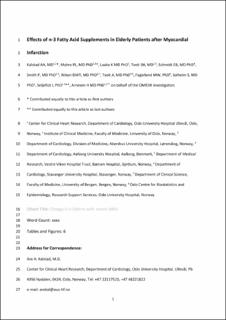Effects of n-3 fatty acid supplementations in elderly patients after myocardial infarction: A randomized controlled trial
Kalstad, Are; Myhre, Peder Langeland; Laake, Kristian; Tveit, Sjur Hansen; Schmidt, Erik Berg; Smith, Pål; Nilsen, Dennis W.T.; Tveit, Arnljot; Fagerland, Morten; Solheim, Svein; Seljeflot, Ingebjørg; Arnesen, Harald
Journal article, Peer reviewed
Accepted version
Permanent lenke
https://hdl.handle.net/11250/2762687Utgivelsesdato
2021Metadata
Vis full innførselSamlinger
- Department of Clinical Science [2318]
- Registrations from Cristin [9791]
Sammendrag
Background: High intake of marine n-3 polyunsaturated fatty acids (PUFA) has been associated with reduced risk of cardiovascular events; however, this has not been confirmed in patients with a recent acute myocardial infarction (AMI). Elderly patients are at particularly increased cardiovascular risk after myocardial infarction, but few trials address this group specifically. Omega-3 fatty acids hold the potential to reduce cardiovascular events with limited adverse effects in this vulnerable group. The hypothesis was that daily addition of 1.8g n-3 PUFA to standard of care secondary prophylaxis in elderly patients who have survived an AMI would reduce the risk of subsequent cardiovascular events during 2 years follow-up.
Methods: The OMEMI trial (Omega-3 Fatty acids in Elderly with Myocardial Infarction) is an investigator-initiated, multicenter, randomized clinical trial adding 1.8 g n-3 PUFA (930 mg eicosapentaenoic acid and 660 mg docosohexaenoic acid) versus placebo (corn oil) daily to standard of care in patients aged 70 to 82 years with recent (2–8 weeks) AMI. The primary endpoint was a composite of nonfatal AMI, unscheduled revascularization, stroke, all-cause death, heart failure hospitalization after 2 years. The secondary outcome was new atrial fibrillation. The safety outcome was major bleeding. Serum fatty acids were measured as biomarkers of adherence.
Results: In total, 1027 patients were randomized. Follow-up data were available for 1014 patients who were included in the intention-to-treat analysis. Mean±SD age was 75±3.6 years, 294 (29%) were female, and mean triglycerides were 111.4±61.9 mg/dL. The primary endpoint occurred in 108 (21.4%) patients on n-3 PUFA versus 102 (20.0%) on placebo (hazard ratio, 1.08 [95% CI, 0.82–1.41]; P=0.60). The secondary endpoint occurred in 28 (7.2%) patients on n-3 PUFA versus 15 (4.0%) on placebo (1.84 [0.98–3.45]; P=0.06). Median changes in eicosapentaenoic acid and docosahexaenoic acid were +87% and +16% for n-3 PUFA versus −13% and −8% for placebo. Major bleeding occurred in 54 (10.7%) and 56 (11.0%) in the n-3 PUFA and placebo groups, respectively (P=0.87). Similar results were found in per-protocol analysis (n=893).
Conclusions: We could not detect reduction in clinical events in our elderly patients with recent AMI who were treated with 1.8 g n-3 PUFAs daily for 2 years.
